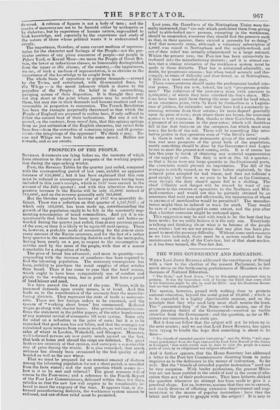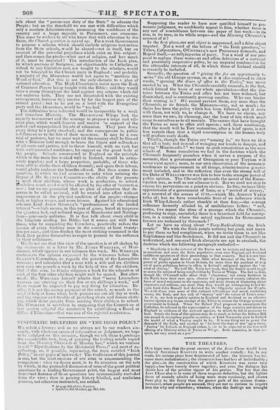THE WHIG GOVERNMENT AND EDUCATION.
WHEN Lord JOHN RUSSELL addressed the constituency of Stroud with a view to the election of the present Parliament, he laid much stress on the forthcoming performances of Ministers in fur- therance of National Education.
" The State," said Lord JOHN, "has in this matter a prominent duty to perform. It was the benevolent wish of George the Third that every child in his dominions might be able to read the Bible : may his illustrious descen- dant see that wish accomplished!"
The session, however, passed with nothing done to promote national education, beyond the usual grant of 20,000/. ; which is to be expended in a highly objectionable manner, and on the principle that they who need help most shall receive the least. The" paramount duty" of the State—which means, one of the most pressing duties of the Government—received no visible attention from the Government : and the question, as far as Mi- nisters are concerned, is in sfatu quo. But it does not follow that the subject will not be taken up in the next session ; and we see that Lord Jonsr RUSSELL has again been trying to kindle the hope that something is about to be done- " The friends of extended popular instruction," says the Globe, "will expe. rienee gratification from the hope expressed by Lord John Russell at the dinner at Liverpool, ' that much would soon be done to raise the people in a moral point of view, by an enlightened and religious education."
And it further appears, that the Home Secretary has addressed a letter to the Pour-law Commissioners directing them to make inquiries as to the deficiency in the means of instruction. So far well. But the "friends of extended popular instruction" need not be very sanguine. With louder professions, the present Minis- ters are not more entitled to the credit of zeal in the cause of edu- cation than any of their predecessors. They have hitherto shirked the question whenever an attempt has been made to give it a practical shape. Let us, however, assume that they are in earnest, and reaily desirous of effecting extensive improvement and aug- mentation in the means of popular instruction : have they the talent and the power to grapple with the subject ? It is easy to talk about the "paramount duty of the State" to educate the People; but on the threshold we are met with difficulties which only a resolute Administration, possessing the confidence of the country and a large majority in Parliament, can overcome. This must be evident to all who know that with education by the State, the Church question is mixed up. For a weak Guvernment to propose a scheme which should exclude religious instruction from the State schools, would be absurd—not in itself, but on account of the powerful prejudices which exist on this subject : and then comes the pinch—what sort of religion, and how much of it, must be imparted ? The introduction of the lush plan, by which portions of Scripture, not objectionable to Catholics, or indeed to any Christian sect, are taught to the scholars, would not he tolerated by the Church party in England ; and probably a majority of the Dissenters would not agree to "mutilate the Word of God." But this is not the only obstacle to a plan of national education. The High Churchmen insist upon the Book of Common Prayer being taught with the Bible ; and they would raise a storm throughout the land against any scheme which did not embrece both. They are not dissatisfied with the existing arrangement, because they receive by far the largest part of the annual grant ; but to be put on a level with the Evangelical party and the Dissenters, would be " too bad."
The difficulties here indicated would be insuperable by a weak and irresolute Ministry. The MELBOURNE Whigs lack the caracity to construct and the courage to propose a large and effi- cient plan. which would deserve and receive ' he support of the ardent and unprejudiced friends of education. They pare down every thing to a petty standard ; and the consequence is, public hidiffereece as to the fate of their measures. It may be a sore trial of patience, but we must wait till the country shall be blessed with a Minister bold enough to brave the bigots and selfseekers of all sects and Ladies, and to throw bitnself, with no rash but with tt• 1-grounded confidence, for support on the great body of the people. Sehoola constructed in England on the principle which in the main has worked well in Ireland, would be exten- sively popular; and a large proportion, probably, of those who were able to clothe their children decently, and spare their labour, would gladly embrace the benefits ofheied. But then comes the question, to which we Lad occasion to refer when noticing the Report of Mr. Si. •NET'S Committee—the ability of the parents to seed their children, whose work is productive, to school. roubtless much pond would be effected by the offer of inetruction note ; but we are persuaded that no plan of education that de- serves to be called moionel, will be carried into effect without improvement in the phy-ical condition of the people—cheaper food, or higher wages, and more leisure. Against his educational schemes Lord Jonet Russero.'s "predominance of the landed interest "—which means, in this year of grace, bread at tenpenee the fit:adorn loaf, and reduced wages at Manchester and Notting- ham—grievously militates. It is fine talk about every child in the kingdom reading his Bible; but it comes not well from those, who by supporting the Corn-laws, practically reduce the income of every working man in the country at least twenty- five per cent., and thus disobey the most striking command in the Book they profess themselves so eager to present to the sufierers Ly their seffishnesa.
We do not see that this view of the question is at all shaken by
the statements in a letter by Mr. JAMES WHEELER, of Man- chester, which appears in our columns this week. Mr. Wnee LER
controverts the opinion expreesed by the witnesses before Mr. SLANEY'S Committee, as regards the poverty of the Lancashire weavers; and calculates that a man with a wife and six children may earn two pounds a week by the help of two of the children. Out ef this sum, he thinks sixpence a week for the education of each uf the four other children might well be spared. But after- west], Mr. Wtteesee himself admits that " many Lancashire weavers are starviug on their five or six shillings a week," and tlese cannot be expected to pay any thing for education. Be- sides, it it is not the money payment at the school, so much as the heed et help at henie when both parents are out all day at work,
and the expense end trouble of providing clean and decent cloth- ing, which deter parents from sending their children to school. Mr. WHEELER is mistaken in supposing that the Commince of last session adopted the resolution for establishing a Board or Office of Educetion—that was one of the .rejected resolutions.



























 Previous page
Previous page